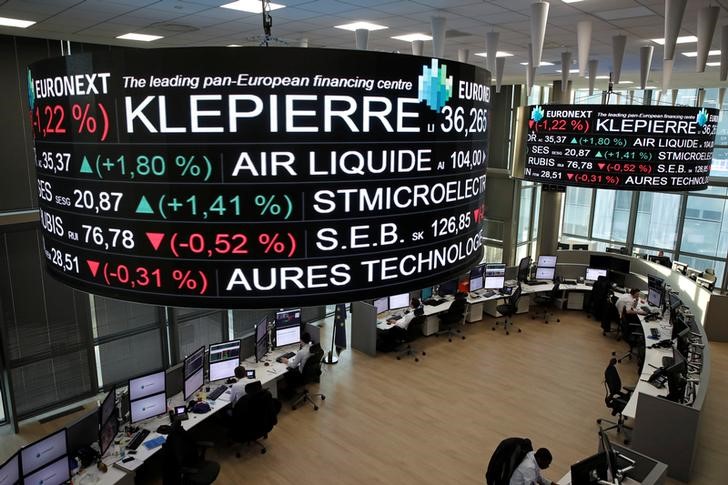By Claire Milhench
LONDON (Reuters) - After a bumper year in which world stock markets have repeatedly smashed records, global investors have raised their equity exposure even further, according to Reuters' latest survey, which showed stocks jumping to 3-1/2-year highs.
The monthly asset allocation poll of 51 wealth managers and chief investment officers in Europe, the United States, Britain and Japan also showed funds slashing their bond allocation to the lowest in over two years, anticipating rising interest rates amid a steady inflation uptick.
The poll was conducted from Dec. 14 to 21, a period in which global equities (MIWD00000PUS) hit another record high.
Stocks have rallied around 21 percent this year helped by improving global growth, whilst a U.S. tax bill - finally passed in the dying days of 2017 - is expected to boost U.S. corporate profitability. [nL1N1OK0BB]
The poll showed overall equity exposure rising 3.2 percentage points to 51.3 percent, the highest since July 2014, and up 5.5 percentage points since the start of 2016.
But investors cut their bond holdings by 3.4 percentage points to 36.6 percent, the lowest level since October 2015.
"Growth is steady and inflation is low; this makes stocks look attractive despite rising valuations," said Trevor Greetham, head of multi-asset at Royal London Asset Management (RLAM). "Bonds remain an underweight, given the low level of yields and the likelihood of gradually rising interest rates."
INFLATION SPURT
Some 64 percent of poll participants who answered a question on the U.S. Federal Reserve expect three interest rate rises in 2018, in line with the Fed's own forecasts. [nW1N1MT00C]
But some fret that the Fed could be behind the curve and might find itself surprised by a sudden spurt in inflation. That could force it to tighten faster than the market expects. Currently two rate hikes are priced in for 2018.
Mouhammed Choukeir, chief investment officer at Kleinwort Hambros, noted U.S. core consumer inflation was at 1.8 percent [nL1N1OC23J] and unemployment at 4.1 percent, indicating a "razor thin" output gap.
"Markets may well be missing the woods for the trees," Choukeir said.
"The 'mystery' of low inflation may prove not to be an enduring one," he added, warning that incoming Fed chair Jerome Powell might overcompensate with "a roaring monetary correction". [nL1N1OE26P]
Just under half of poll participants who answered a question on the European Central Bank (ECB) thought it would end its asset purchase programme by end-2018.
"We expect the ECB to be surprised by higher-than-expected inflation in an environment of growth strongly above potential," said Martin Wolburg, senior economist at Generali (MI:GASI) Investments.
At its December meeting, the ECB stuck to its pledge to continue asset purchases for as long as necessary, despite better growth and inflation forecasts. [nL8N1OE185]
But many thought it would not be able to maintain this stance much longer, especially with splits opening in the governing council. [nL8N1NT38G]
"The expansion in the European economy looks self-sustaining, barring a major external shock, and the hawks on the ECB will increasingly warn about future inflation risks, as well as the side effects of sustained quantitative easing on financial markets," said Andrew Milligan, head of global strategy at Aberdeen Standard Investments.
Within their global equity portfolios, investors raised their U.S. exposure by 2.5 percentage points to 40.8 percent, and their Japanese holdings to 18.9 percent, the highest since April 2016.
Japanese stocks (TOPX) are up 20 percent this year, thanks to faster economic growth and company earnings, while the cabinet has just endorsed a record $860 billion budget for 2018. [nL4N1OM1H8]
POLITICAL RISK
British stocks remained out of favour however, with Brexit uncertainties prompting funds to cut holdings by 2.5 percentage points in December to 8 percent, the lowest in at least five years. [nL8N1OM1QV]
Euro zone equities too were cut by 1.8 percentage points to 17.8 percent, the lowest since April.
European stocks (STOXX) have risen 8 percent this year after election-related political risks failed to materialise. But nearly 60 percent of poll participants who answered a special question, expected political risk to be higher in Europe next year than in the United States.
Several respondents cited the upcoming Italian election, where eurosceptic parties are polling strongly. [nL8N1OI4XS]
"That said, I do not think that those political risks are signficant. Contrary to 2017, political risks will no longer be at the forefront in 2018," said Jan Bopp, an asset allocation strategist at J Safra Sarasin.
Nearly a third opted for the United States, given the ongoing investigation by Special Counsel Robert Mueller into ties between Donald Trump's presidential campaign and Russia [nL1N1OK29T], the November mid-term elections.
"A desire to set the agenda could also see a more forceful White House on the international stage, raising the risk of military confrontation with North Korea," said RLAM's Greetham.
